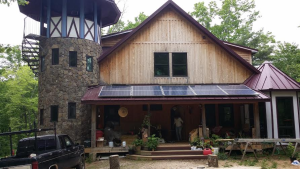Off-Grid Solar Home Thriving in North Georgia
 (APN) FANNING COUNTY — In northwest Georgia’s Fannin County, Bill Fleming, Jacquelyn Howard and their daughter, Aliza, live in a large four thousand square foot home that is totally off the grid, with another 1,200 square feet in the basement.
(APN) FANNING COUNTY — In northwest Georgia’s Fannin County, Bill Fleming, Jacquelyn Howard and their daughter, Aliza, live in a large four thousand square foot home that is totally off the grid, with another 1,200 square feet in the basement.
The house was designed by Randall and Rhoen Carlson.
The roof is a Stand ‘n Seam metal roof, specially designed to attach solar panels without piercing the roof. It supports forty solar panels, with each panel measuring three by five feet. More solar may be added later.
In the basement, Fleming has state of the art equipment, including an inverter with three solar panel banks and two large industrial batteries. The life expectancy of the batteries is ten years.
The hybrid inverter/charger takes the DC power generated from the solar panels and stored in the batteries and converts it to AC power. Most of the appliances and lights run on AC power.
The only items in the home that are not powered by solar energy are the cooking stove, tankless on-demand water heater, and clothes dryer, which run on propane.
“Living by solar, you amend your behavior and do things differently. For example, when it is a cloudy day or night time, you don’t do the laundry or run the dishwasher,” Fleming told Atlanta Progressive News.
The house is heated by a double burn wood furnace in the basement that is seventy percent efficient. The furnace does not heat air – it heats water in a holding tank; then the hot water is pumped through radiant heat tubing under the first floor where metal sheets spread the heat evenly.
“The furnace heats the water, that heats the floor, and the hot air rises to heat the house during the winter,” Fleming said.
This is a radiant floor heating system that is a closed system, and the hot water is not used for anything else.
Hot water for bathing, dishwashing, and clothes washing comes from another system, a propane driven tankless on demand hot water system that immediately heats up water as needed and then cuts off.
In the winter months, an outside propane generator recharges the batteries when the sun does not shine.
“In the spring, summer, and fall months, we have more sun days, and don’t have to think about our energy usage… but in the winter months we put on more layers of clothes to conserve energy,” Howard told APN.
It is their first year living off the grid, and they are still learning and experimenting on how to do things better, especially during the winter.
“This next winter, I’m going to purchase an independent refillable propane heater that is movable to spaces I want to heat for short periods… because I’m more cold-natured than Bill,” Howard said.
If a house this large can go off the grid in the mountains of North Georgia, just think how easy a smaller house could go off the grid in warmer South Georgia.
Howard is also planting an organic garden to feed the family.
Fleming plans to broadcast from a solar radio station in his home, possibly with the call letters WBRR. It will broadcast only during the day and will be commercial free.
In the future, the house is hoped to serve as a place for community meetings, the radio station, and possibility a school.
In Atlanta, Fleming is better known as an activist/musician with the EX-PAND band.
Fleming is currently planning a solar expo next year to bring together solar companies and people who want to get off the grid or just add solar to their home.
(END/2016)
No mention of cost for this system. I use Georgia Power for electricity and SCANA for gas and suffer no deprivations on energy use and pay about $2000 per year for my service. My guess is they have 5 kilowatts of solar panels. It appears none is at optimum orientation of facing due South at 33 degrees elevation. With proper orientation they would get maybe 7000 kilowatt-hours per year which has a value of $840 from Georgia Power. Since their solar panels are not correctly oriented, I suspect they pickup 6000 kilowatt-hours per year. This would be very sparse living for a house that size.
You only see the front of the house but solar panels are on the roof in other directions.
Gloria Tatum, thanks for your reply. This only reinforces my statement these solar panels are not placed on the house to get the maximum number of kilowatt-hours. This has to be a very expensive toy for the rich that the average person could not afford. There annual gas and electric costs would be double or more than provided by Georgia Power or Scana energy.
James, I feel suspicious of your eagerness to dismiss this solar plan. Perhaps the article should have discussed the cost, but you seem fixated on price, to the exclusion of other factors.
“It is their first year living off the grid, and they are still learning and experimenting on how to do things better…” It seems that this family finds value in their off-the-grid lifestyle. They have chosen to be pioneers and to show others how it can be done.
I’m very interested in living off grid and growing my own vegetables and chickens etc. what advise do you have for someone just starting out? I live in Atlanta area and want to move more toward the country .